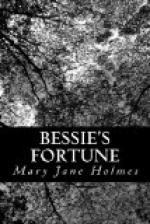When Mrs. Wetherby died, her nephew sent a message to his father and sister, announcing her death, and the time of the funeral. He felt it his duty to do so much, but he did not say to them, “Come, I expect you.” In fact, away down in his heart, there was a hope that they would not come. His father was well enough in Allington, where he was known; but, what a figure he would cut in Boston, in his old drab surtout and white hat, which he had worn since Burton could remember. Hannah was different, and must have been pretty in her early girlhood. Indeed, she was pretty now, and no one could look into her pale, sad face, and soft dark eyes, or listen to her low, sweet voice, without being attracted to her and knowing instinctively that, in spite of her plain Quakerish dress, she was a lady in the true sense of the word. So, when she came alone to pay the last token of respect to the aunt who had never been very gracious to her, Burton felt relieved, though he wished that her bonnet was a little more fashionable, and suggested her buying a new one, which he would pay for. But Hannah said “no,” very quietly and firmly, and that was the end of it. The old style bonnet was worn as well as the old style cloak, and Burton felt keenly the difference between her personal appearance and his own. He, the Boston dandy, with every article of dress as faultless as the best tailor could make it, and she, the plain countrywoman, with no attempt at style or fashion, with nothing but her own sterling worth to commend her, and this was far more priceless than all the wealth of the Indies. Hannah Jerrold had been tried in the fire, and had come out purified and almost Christlike in her sweet gentleness and purity of soul. She knew her brother was ashamed of her—whether designedly or not, he always made her feel it—but she had felt it her duty to attend her aunt’s funeral, even though it stirred anew all the bitterness of her joyless life.
And now the funeral was over, and she was going home that very afternoon—to the gloomy house among the rocks, where she had grown old, and her hair gray long before her time—going back to the burden which pressed so heavily upon her, and from which she shrank as she had never done before. Not that she wished to stay in that grand house, where she was so sadly out of place, but she wanted to go somewhere, anywhere, so that she escaped from the one spot so horrible to her. She was thinking of all this and standing with her face to the window, when her brother entered the room and began, abruptly:
“I say, Hannah, I want to ask you something. Just before Aunt Wetherby died, she had a long talk with me on various matters, and among other things she said she believed there was something troubling you and father, some secret you were hiding from me and the world. Is it so? Do you know anything which I do not?”
“Yes, many things.”




